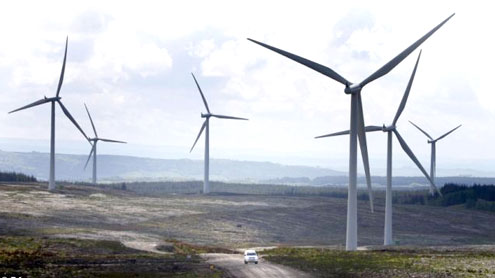
The relentless march of onshore wind farms is at an end, a minister declared last night.
Insisting ‘enough is enough’, John Hayes said turbines had been ‘peppered around the country’ with little or no regard for local opinion.He said existing sites and those in the pipeline would be enough to meet green commitments with no need for more.‘Even if a minority of what’s in the system is built we are going to reach our 2020 target,’ he said. ‘I’m saying enough is enough.’
Mr Hayes told the Mail he had commissioned research on the impact of wind turbines on the landscape and whether they drive down house prices.He has also asked scientists to examine noise complaints and more sinister suggestions that the turbines endanger military aircraft by blocking radar signals.The intervention by Mr Hayes, who became energy minister in last month’s reshuffle, will delight 100-plus fellow Tory MPs who have urged David Cameron to take a more sceptical approach to onshore wind power.
It does however risk a clash with the Liberal Democrats, who are enthusiastic advocates of renewable energy.Mr Hayes suggested the controversy over turbines was giving other sources of renewable power – such as offshore wind, solar and tidal power – a bad name.‘The onshore wind debate is skewing the whole debate, which is not good for the Government, not good for people and not good for the renewables lobby,’he told the Mail.
‘We can no longer have wind turbines imposed on communities. I can’t single-handedly build a new Jerusalem but I can protect our green and pleasant land.‘Firstly, I have asked the planning minister to look again at the relationship between these turbines and the landscape.‘It seems extraordinary to have allowed them to be peppered around the country without due regard for the interests of the local community or their wishes.‘We have issued a call for evidence on wind. That is about cost but also about community buy-in. We need to understand communities’ genuine desires.’
Mr Hayes said policy should not be based on some ‘bourgeois left article of faith’.‘These things are about the people and I am the people’s minister,’ he added.‘I want to look at a broader analysis of the effects – I mean house price values, and other quality of life issues. I want to look particularly at noise, so I have asked the Institute of Acoustics to look at the noise issue from a completely independent perspective.
‘There is a case where people had to move from their family farm because of noise. It is very often the case that local authorities don’t have the wherewithal to address these planning issues.’Mr Hayes said defence ministers had agreed to investigate claims of radar interference from the spinning blades.The Government has set a target of increasing the amount of power generated by onshore wind farms to 13 gigawatts by 2020.
But in an indication of a shift in Government policy, ministers announced this summer that the subsidy for onshore wind power generation would be cut by 10 per cent this year.Approvals for onshore wind farms – around 3,800 turbines are in operation – have however reached record levels, according to figures published yesterday.
RenewableUK, the wind industry trade body, said in a statement: ‘For the first time in five years, the UK is seeing a rise in the amount of UK capacity approved at a local level.’There was a 15 per cent increase in approval rates for smaller onshore projects with capacity of less than 50 megawatts last year compared with the previous year, it said.
Applications for new wind farms have to be made to councils, and around a half are refused. But under the existing system, energy companies often win on appeal to the planning inspectorate.Campaigners took heart from a court ruling in May, in which villagers in Hemsby, on the edge of the Norfolk Broads, succeeded in blocking four 350ft turbines after a judge agreed their right to preserve their landscape was more important than renewable energy targets.
Tory MP Chris Heaton Harris, who has led calls for a rethink on wind power, said of Mr Hayes’s remarks: ‘This is a huge step forward. These awful turbines do nothing for the environment – they barely reduce CO2 – they force up energy bills and put more people into fuel poverty.‘It’s about time the Government listened in this way. Communities will be delighted that they may now be spared the torment they have seen others go through when turbines go up.’
Former Conservative Chancellor Lord Lawson, an arch-sceptic on climate change, said: ‘I would welcome the minister’s statements. I would hope they would translate into a moratorium. An additional problem is that wind power is one of the most expensive forms of generating electricity there is.‘At a time when there is so much concern both from households and industry about the cost of energy, that too should be a decisive argument against going this way.’ – Dailymail












